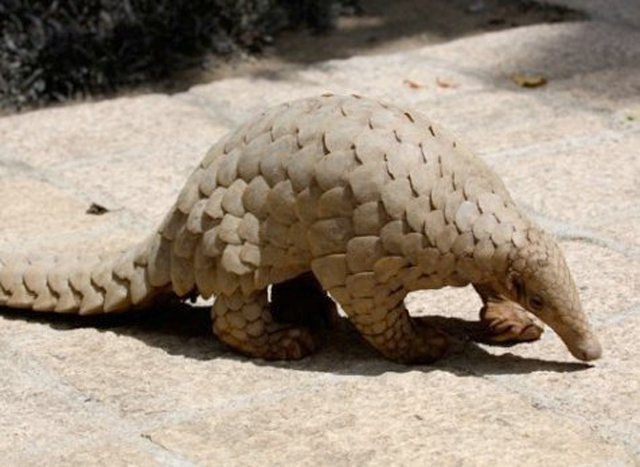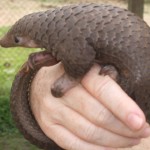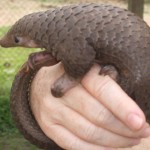A university professor reports unchecked pangolin slaughter in Pakistan and suggests that it may be aided by politicians.

A recently formed team of researchers have discovered that Indian pangolins (Manis crassicaudata) living in the far western reaches of the species’ range are suffering rampant killing for their scales.
A report from Arid Agriculture University of Rawalpindi professor, Dr. Tariq Mahmood, was featured in Pakistan’s The International News yesterday, detailing the extent of the emerging problem.
Nearly 50 dead pangolins found since December
The professor says his team first became aware of a surge in illegal pangolin trade in the Potohar plateau region of Pakistan when they discovered seven Indian pangolin carcasses in December 2011.
The researchers have reportedly found a total of at least 49 scaleless carcasses since then, including 44 this month alone.
Many of the bodies were found in or near a railway tunnel close to Chakwal.
Local sources apparently told the team that around 24 kilograms of the animals’ scales were sent to Islamabad last month.
There seems to have been an increase in reports of pangolin killing since June 2011 – especially in the areas surrounding Islamabad and in Pind Dedan Khan.
Unfortunately, it seems the animals are even being targeted in protected areas like Margalla Hills National Park.
Corrupt politicians interfere with justice
Government level corruption is rife throughout international wildlife crimes – and trade in the scaly anteaters of Pakistan seems to be no exception.
Apparently, a district wildlife officer that recently filed a case against a suspected pangolin killer in Chakwal has since been pressured by local politicians to drop the case.
Professor Mahmood explains that bringing offenders to justice is crucial to halting the problem.
The people involved in its killing must be identified and stopped.
If urgent measures are not taken to save this unique animal species, which has a very low reproductive rate, it will result in its extinction in Pakistan.
Indeed, it is against Pakistani law to hunt, possess, transport, import, export, or trade in Indian pangolins, which are listed as ‘Near Threatened‘ on the International Union for the Conservation of Nature’s Red List of Threatened Species.
Under the Islamabad Wildlife (Protection, Preservation, Conservation, and Management) Ordinance of 1979, pangolin killers face a fine of up to Rs 1,000 (a mere US $11), imprisonment for no more than one year, or both.
Meanwhile, Dr. Mahmood says the animals fetch around Rs 8,000 – Rs 12,000 (US $88-$132) each in the black market.
Boiled alive
The professor suggests that the pangolin murderers boil the animals alive, which softens the scales enough to be removed.
Though not always alive when it happens, this practice is known to occur in China and other parts of East and Southeast Asia.
Mahmood claims the scales are used to make ‘bullet-proof jackets’, but it is also hard to ignore the fact that there is an insatiable demand for pangolin scales for use in traditional Chinese medicines.
Killing for a myth
An estimated 41,000 (and perhaps as many as 60,000) pangolins were poached from the wild in 2011 alone.
This rampant slaughter is driven by an insatiable demand for the animals that stems primarily from China and Vietnam.
There, the flesh of pangolin adults and fetuses is considered a delicacy and is also mistakenly thought by some to provide health benefits, such as kidney nourishment.
Additionally, traditional Chinese medicine consumers superstitiously believe concoctions derived from the scales, blood, and other pangolin body parts can cure a wide variety of health conditions, such as reducing swelling, improving liver function, promoting weight loss, stimulating blood circulation, and enhancing lactation in breast-feeding women.
Whole carcasses are even soaked in vats of wine or other alcohols to make ‘health tonics’.
Yet there is no scientific evidence to support any of the medicinal claims made about pangolin body parts.
In fact, rhino horn and pangolin scales (much like our own hair and nails) are chiefly composed of keratin and studies have repeatedly shown rhino horn to be void of any curative properties. (Read more about the illicit trade in pangolins here.)
It’s now believed that the plundering of these mammals has been greatly amplified by lucrative ‘medicinal use’ pangolin farming ventures in China, which have seem to have significantly increased the demand for these animals.
Author: Sarah Pappin. Read more about Sarah here.
Image by Dushy Ranetunge (own work) via Wikimedia Commons



![‘Pangolins in Peril’ [Video]](https://www.pangolins.org/wp-content/uploads/2011/10/TRAFFICPangolinCurled-150x150.jpg)


Comments are closed.